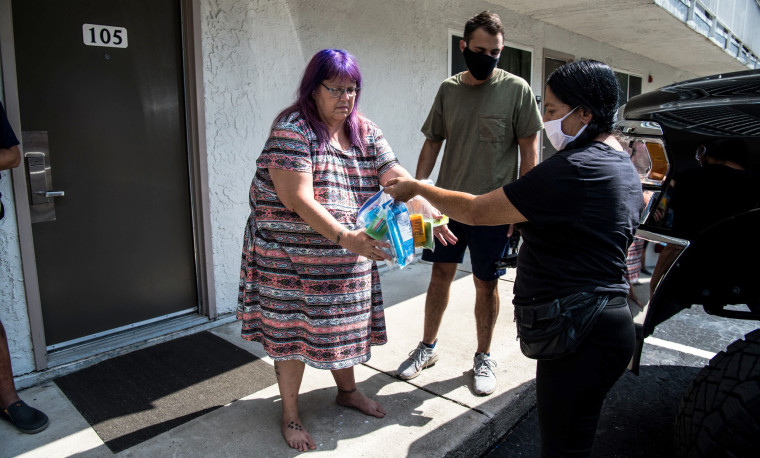Around 787,000 people filed for first-time unemployment benefits last week, a much smaller total than the 875,000 that analysts had predicted and the lowest weekly count since March.
Continuing claims, which track people seeking ongoing unemployment benefits, fell to 8.373 million from a prior 9.397 million, according to data from the Department of Labor.
Thursday's weekly report comes as 39 states see a rise in coronavirus cases. The Centers for Disease Control and Prevention said Wednesday afternoon that it had noted a "distressing trend" in which coronavirus case numbers are "increasing in nearly 75 percent of the country."
Midwestern states have seen spikes in Covid-19 case numbers in the last two weeks as the cold weather forces people indoors, leading to closer gatherings of family and friends.
Stimulus talks between House Speaker Nancy Pelosi, D-Calif., and Treasury Secretary Steven Mnuchin continue to drag on, leaving millions of families still struggling to meet their most basic needs as lawmakers try to reach a deal before Election Day. The last round of fiscal aid, which included a $600 in additional weekly benefits for out-of-work Americans, expired at the end of July.
“I’m optimistic that there will be a bill. It’s a question of, is it in time to pay the November rent, which is my goal, or is it going to be shortly thereafter and retroactive?” Pelosi told MSNBC on Wednesday.
While down from a record high of almost 7 million in March, weekly claims have remained stubbornly high since the start of the pandemic, and have far surpassed the previous record of 665,000 during the Great Recession of 2007-2009.
Thursday's lower weekly jobless claims number partly reflects the fact that some longer-term unemployed workers have now lost eligibility for the 26-week program and have moved to other pandemic unemployment assistance programs.
"The labor market is far from being out of the woods," said AnnElizabeth Konkel, economist at Indeed Hiring Lab. "The sharp rise of expanded benefits claims points to this protracted pain. At least a portion of the drop in regular continuing claims is due to claimants exhausting benefits and then shifting to Pandemic Emergency Unemployment Compensation. With falling temperatures and the holidays a few weeks aways, there is no obvious relief on the horizon."
Seven months into the pandemic, corporations continue to shed thousands of jobs. Many people who were temporarily laid off now find they will not be rehired at all, as businesses attempt to right-size amid a distressed economy.
On Thursday, Southwest Airlines reported a $1 billion loss for its most recent quarter, its biggest ever, as it seeks to protect thousands of jobs despite record lows in passenger traffic. The airline industry has already seen 10s of thousands of job losses and could see hundreds of thousands more if additional aid is not made available.
"We urge our federal leaders to pass an economic relief package that includes a clean, six-month extension of the Payroll Support Program to further protect jobs and crucial air travel," Southwest Chief Executive Officer Gary Kelly said Thursday.
American Airlines and United Airlines have already furloughed around 35,000 workers, with thousands more signing up for early retirement. Hong Kong carrier Cathay Pacific said Wednesday it would be slashing 8,500 jobs worldwide, or one-quarter of its work force.
Amtrak said Wednesday it may need to cut up to 2,400 more jobs if it does not receive $2.8 billion in emergency aid before the end of the year. With train ridership down by 97 percent, the company has already furloughed more than 10 percent of its 20,000-member staff.
The energy sector has also suffered steep losses due to the lack of travel, which has further depressed oil demand. Oil giants Royal Dutch Shell and BP are slashing up to 15 percent of their workforce, and Exxon Mobil, the nation's second-largest oil company, said Wednesday it is "very close" to finalizing a review of its 75,000-strong workforce.
With barely two weeks left until the presidential election, the unparalleled joblessness remains a top priority for the two candidates as they prepare to face off in their final debate Thursday night.
Despite some improvements since spring, there are still more than 10 million jobs yet to be recovered, and more jobs are disappearing permanently.

